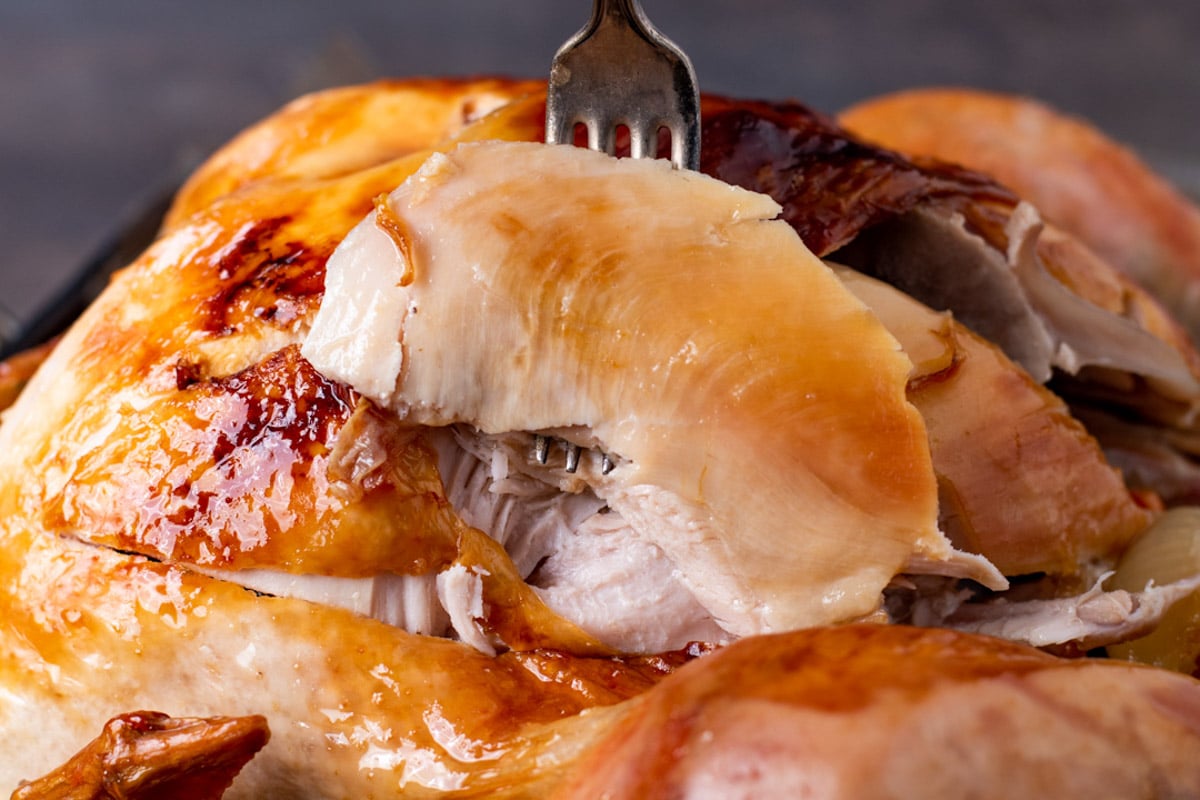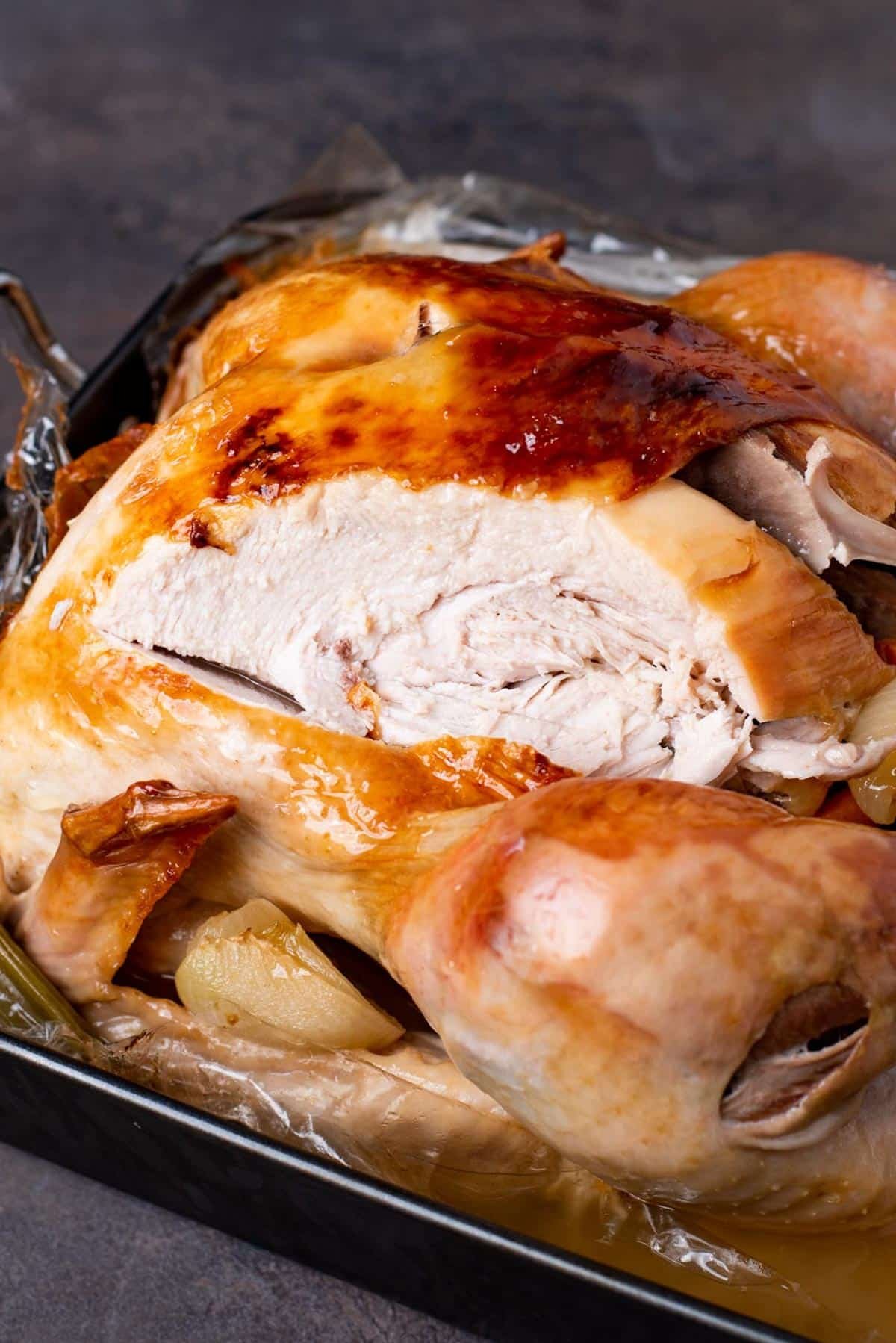Get a perfectly moist, golden brown turkey by baking turkey in a bag. Everything you need to know for seasoning and cooking turkey.
All of those are delicious, but today I’m sharing the way my mom always cooks turkey…baking turkey in a bag!
Come Thanksgiving, many home cooks wonder if using an oven bag is the best way to cook a turkey. This method promises a foolproof, fuss-free bird with tender, juicy meat. But are the benefits worth sacrificing crispy skin and deep roasted flavor? Let’s take an in-depth look at the pros and cons of cooking turkey in a bag.
What is an Oven Bag?
An oven bag is a specially designed nylon or polyester bag certified for use in the oven up to 400°F. It allows heat and moisture to circulate while retaining juices. Oven bags for turkeys are oversized to fit birds up to 24 pounds. Most turkey oven bags have an oven-safe tie for securing the sealed bag.
The Benefits of Cooking in a Bag
There are several advantages to using an oven bag for your holiday bird:
-
Juicy meat – The bag seals in moisture extremely well Turkey cooked in a bag is very juicy and tender,
-
Self-basting – The bag allows juices and steam to continuously baste the turkey, No manual basting required
-
Speeds cooking – Turkey cooks up to an hour faster in a bag, since it’s essentially being steamed.
-
Minimal cleanup – The bag contains all drips and splatters. Just throw away the bag when done.
-
Easy gravy – Pour juices from bag into a saucepan to make flavorful gravy.
The Downsides of Cooking in a Bag
However, there are some drawbacks to the oven bag method:
-
No crispy skin – The constant moisture makes it nearly impossible to achieve browned, crispy skin.
-
Muted flavor – Without roasting in open air, you miss out on rich roasted turkey flavor.
-
Can’t stuff turkey – Stuffing may not reach a safe temperature if turkey cooks faster.
-
Plastic waste – Single-use oven bags create more waste versus reusable roasting pans.
-
Chemical concerns – While oven bags are considered safe, some avoid cooking with plastic.
Other Ways to Keep Turkey Moist
If you want guaranteed juicy turkey without the bag, consider these alternatives:
-
Brining – Soaking the turkey in a saltwater brine infuses moisture.
-
Dry brining – Rubbing turkey with salt and letting sit improves texture.
-
Butter rubbing – Massaging butter under the skin keeps meat very moist.
-
Aromatic padding – Placing herbs/citrus inside cavity perfumes the meat.
-
Basting – Frequently spooning pan juices over turkey prevents drying.
Tips for Cooking Turkey in an Oven Bag
If you do opt to use a bag, follow these tips:
-
Choose a turkey 24 lbs or under to fit most bags. Completely thaw.
-
Prep turkey as desired – truss, rub with oil/butter, season.
-
Add 1 tbsp flour inside bag to prevent bursting. Shake to coat.
-
Fill bag with aromatics like onion, carrots, herb stems.
-
Place turkey in bag breast-side up. Secure top with oven-safe tie.
-
Make 6 small slits for thermometer access. No part of bag should touch oven.
-
Cook at same temp as recipe states, but check about 1 hour earlier.
-
Let rest in bag 30 mins before removing turkey and making gravy with juices.
The Verdict
For easy, fuss-free turkey with supremely juicy meat, oven bags work wonderfully. However, you sacrifice deep roasted flavor and crispy skin. Many home cooks opt for open roasting combined with brining, basting and butter to get the best of both worlds. While convenient, oven bags aren’t required for moist, delicious turkey. Consider your priorities, then decide if cooking turkey in a bag is right for your Thanksgiving table.
:max_bytes(150000):strip_icc()/oven-bag-turkey-recipe-2098986-Ingredients-5bc8def646e0fb00262f327f.jpg)
What temperature should turkey be cooked to?
According to the USDA, a whole turkey is safe when cooked to a minimum internal temperature of 165 °F. Using a food thermometer, check the internal temperature in the innermost part of the thigh and the thickest part of the breast.
Many people find that they prefer turkey meat cooked to a higher temperature, around 170-180º Fahrenheit. You definitely don’t want your turkey dry, however, I do prefer the texture of a turkey cooked to a higher temperature.

Can you cook a turkey in a bag in an electric roaster?
You should not use a plastic oven bag in an electric roaster. No part of the bag should touch the sides, top or bottom of the roaster (or oven for that matter), and in an roaster oven, that is sometimes hard if the roaster is small.

How To Cook A Turkey EASY | OVEN BAG Turkey Recipe | Simply Mamá Cooks
FAQ
Is it better to cook a turkey in a bag or without a bag?
Does cooking a turkey in a bag affect cooking time?
Should you bake a turkey in a bag or foil?
Is cooking turkey in a plastic bag safe?
Should you put Turkey in a bag?
Turkey in a bag makes for easier cleanup, too—no scrubbing a dirty roasting pan. Simply throw the bag in the trash after you’ve strained out the juices to make turkey gravy. If popping plastic in the oven seems like a bad idea, don’t worry. Oven bags are made of materials that are heatproof past the average temperatures used in ovens.
What are the health benefits of ground turkey?
Ground turkey has multiple benefits. It is a good source of minerals, and B vitamins, rich in proteins, low in fat and it is lower in calories than common turkey.
Why should you cook a Turkey in a bag?
It traps in moisture to help the turkey stay juicy and tender as it cooks. Cooking in a bag also saves time, as your turkey will cook about an hour faster in the bag than what your recipe specifies. A bag is also self-basting, which means condensation collects in the bag and drips onto the turkey as it cooks.
Can you cook a Turkey in a paper bag?
If the bag touches the top or sides of the oven, it will melt. Allow space for it to expand during cooking. You cannot cook a turkey in a paper bag (or other type of bag). The glue, ink and other materials are not food-safe. Plus, you can never be sure how your bag will survive in the hot oven.
